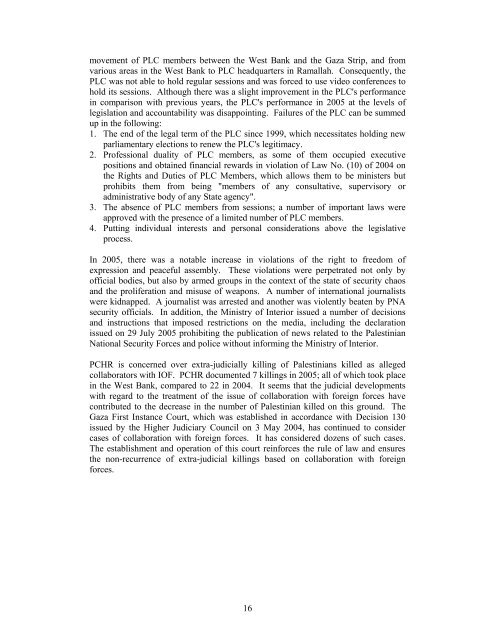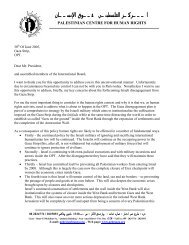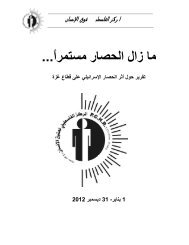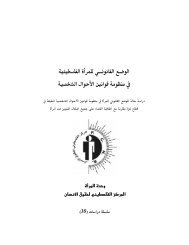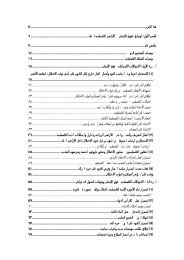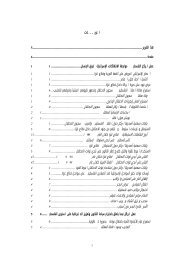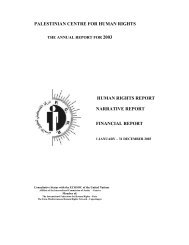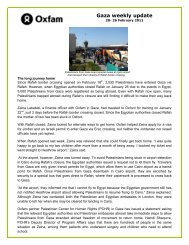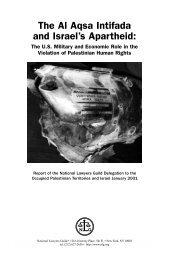Annual Report - Palestinian Center for Human Rights
Annual Report - Palestinian Center for Human Rights
Annual Report - Palestinian Center for Human Rights
You also want an ePaper? Increase the reach of your titles
YUMPU automatically turns print PDFs into web optimized ePapers that Google loves.
movement of PLC members between the West Bank and the Gaza Strip, and from<br />
various areas in the West Bank to PLC headquarters in Ramallah. Consequently, the<br />
PLC was not able to hold regular sessions and was <strong>for</strong>ced to use video conferences to<br />
hold its sessions. Although there was a slight improvement in the PLC's per<strong>for</strong>mance<br />
in comparison with previous years, the PLC's per<strong>for</strong>mance in 2005 at the levels of<br />
legislation and accountability was disappointing. Failures of the PLC can be summed<br />
up in the following:<br />
1. The end of the legal term of the PLC since 1999, which necessitates holding new<br />
parliamentary elections to renew the PLC's legitimacy.<br />
2. Professional duality of PLC members, as some of them occupied executive<br />
positions and obtained financial rewards in violation of Law No. (10) of 2004 on<br />
the <strong>Rights</strong> and Duties of PLC Members, which allows them to be ministers but<br />
prohibits them from being "members of any consultative, supervisory or<br />
administrative body of any State agency".<br />
3. The absence of PLC members from sessions; a number of important laws were<br />
approved with the presence of a limited number of PLC members.<br />
4. Putting individual interests and personal considerations above the legislative<br />
process.<br />
In 2005, there was a notable increase in violations of the right to freedom of<br />
expression and peaceful assembly. These violations were perpetrated not only by<br />
official bodies, but also by armed groups in the context of the state of security chaos<br />
and the proliferation and misuse of weapons. A number of international journalists<br />
were kidnapped. A journalist was arrested and another was violently beaten by PNA<br />
security officials. In addition, the Ministry of Interior issued a number of decisions<br />
and instructions that imposed restrictions on the media, including the declaration<br />
issued on 29 July 2005 prohibiting the publication of news related to the <strong>Palestinian</strong><br />
National Security Forces and police without in<strong>for</strong>ming the Ministry of Interior.<br />
PCHR is concerned over extra-judicially killing of <strong>Palestinian</strong>s killed as alleged<br />
collaborators with IOF. PCHR documented 7 killings in 2005; all of which took place<br />
in the West Bank, compared to 22 in 2004. It seems that the judicial developments<br />
with regard to the treatment of the issue of collaboration with <strong>for</strong>eign <strong>for</strong>ces have<br />
contributed to the decrease in the number of <strong>Palestinian</strong> killed on this ground. The<br />
Gaza First Instance Court, which was established in accordance with Decision 130<br />
issued by the Higher Judiciary Council on 3 May 2004, has continued to consider<br />
cases of collaboration with <strong>for</strong>eign <strong>for</strong>ces. It has considered dozens of such cases.<br />
The establishment and operation of this court rein<strong>for</strong>ces the rule of law and ensures<br />
the non-recurrence of extra-judicial killings based on collaboration with <strong>for</strong>eign<br />
<strong>for</strong>ces.<br />
16


